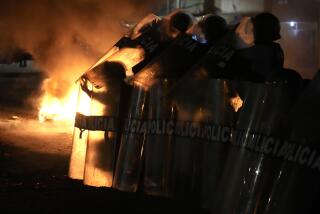Salvador Failing to Fulfill Pact, U.N. Says : Central America: Some tainted officers have not been fired, Security Council contends, and guerrillas still have arms.
- Share via
UNITED NATIONS — The Security Council chastised President Alfredo Cristiani and the former rebel guerrillas Tuesday for failing to fulfill all the requirements of the U.N.-brokered peace agreements that ended the long civil war in El Salvador.
But in private, ambassadors acknowledged that they are far more troubled by Cristiani’s refusal to dismiss all tainted officers of his armed forces than by the failure of the guerrillas to destroy all their weapons.
“The failure of President Cristiani causes a disquiet,” said a European member of the Security Council, “and raises the question of how free he really is of the armed forces.”
The Security Council chastisement came in the form of a statement approved unanimously by its 15 members. The statement does not have the force of a council resolution and contained no threat to punish either the government or the guerrillas if they persist in their refusal.
“The Security Council emphasizes the solemn nature of the undertakings made by each of the parties when they signed the peace agreements and reaffirms the obligation of the parties to comply fully and in a timely fashion with those undertakings,” the statement said.
Ambassadors were hoping the Clinton Administration could pressure Cristiani with the threat of withholding military aid.
Atop this, they believe that Cristiani will feel even more pressure next month when a U.N. “truth commission” of prominent international statesmen, as part of the peace agreement, publishes its report on atrocities committed by both sides.
The report is expected to implicate the Salvadoran armed forces in several dark incidents of the war.
The civil war, which lasted 12 years, came to an official end with ceremonies in San Salvador last Dec. 15. But some important issues were left hanging.
The Ad Hoc Commission of Salvadorans, under the peace agreement, called for Cristiani to discharge 76 military officers and transfer 26 others to different functions. The list of names, never made public, was sent to Cristiani and to U.N. Secretary General Boutros Boutros-Ghali.
But instead of complying with the commission’s demand, Cristiani dismissed 23 officers, transferred 25, allowed 39 to remain in the army until their retirement within six months, named seven as military attaches in Salvadoran embassies and deferred action on eight others for the remainder of his term.
Boutros-Ghali ruled that Cristiani’s actions on 87 officers complied with the peace agreements but that his appointment of seven as attaches and his deferral of action on eight others were violations.
The secretary general also reported that the Faribundo Marti National Liberation Front, the rebel organization, had failed to destroy all its arms and equipment by the deadline of Jan. 29.
An ambassador who knows the Salvadoran situation well said the problem centers on some disgruntled mid-level officers in the guerrilla army who are holding on to their weapons in hopes of trading them later for land or a job. He also said that some rebels are hiding weapons to sell them illegally on the international arms market, especially to Colombian drug dealers.
While scolding both former belligerents in the war, the Security Council welcomed the Salvadoran government’s request for U.N. monitoring of its presidential and legislative elections in March, 1994.
Most analysts believe that these elections, the first since the war’s end, will demonstrate whether El Salvador has really made the transition from violence to democratic peace.
More to Read
Sign up for Essential California
The most important California stories and recommendations in your inbox every morning.
You may occasionally receive promotional content from the Los Angeles Times.













